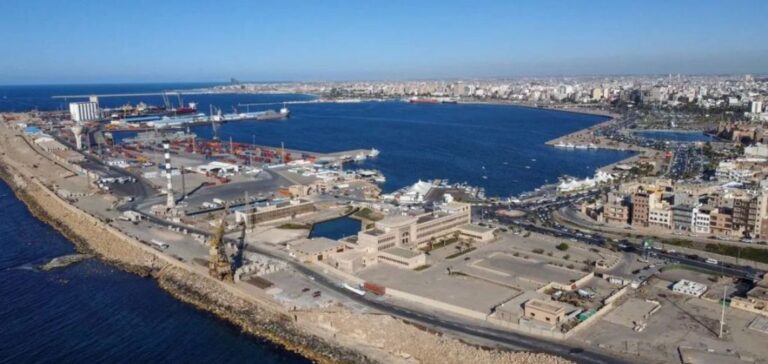Libya’s UN-recognized national unity government, based in Tripoli, denied on Thursday that it had ceded rights to an important civilian port or authorized its use as a military base by foreign forces.
Accusations of selling off the port of al-Khoms: Official reaction from the Libyan government
“What is being said about the state handing over or authorizing the operation of al-Khoms seaport as a foreign naval base is incorrect and unfounded,” said Mohamed Hamuda, spokesman for Abdelhamid Dbeibah’s government.
He made the statement at the port of al-Khoms, with Libyan Navy Chief of Staff Noureddine el-Bouni at his side. And the Director of the Ports and Maritime Transport Authority, Mohamed el-Siwiwi. The spokesman was reacting to protests by hundreds of residents of this coastal town, 120 km east of Tripoli. They accuse the government of wanting to cede part of this civilian port to Turkey, a country allied to the Dbeibah government, for military purposes. From Sunday to Thursday morning, they set fire to tires. They also blocked roads and access to this major commercial port. According to videos on social networks.
Calling for restraint, Mr. Hamuda warned against any “harm to the public interest”, saying that such acts “expose the perpetrators to criminal prosecution”.
Prime Minister Abdelhamid Dbeibah attaches “great importance” to this commercial port, with plans to develop it to increase trade “with other states”, he added.
The port of al-Khoms, one of Libya’s largest and most important, can handle a million tonnes of containers a year. Along with Misrata, further east, it is considered a strategic site. Heavy fighting overshadowed these demonstrations on Monday. And on Tuesday, two armed groups clashed in Tripoli (western Libya). The worst in a year, with 55 dead and 146 injured. Oil-rich Libya plunged into security chaos after the fall of Muammar Gaddafi’s regime in 2011. Two governments have been vying for power for the past year: Mr. Dbeibah’s government in the west and the one in the east backed by the powerful Marshal Khalifa Haftar.






















